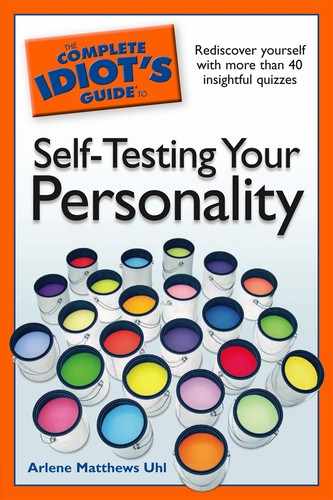Quiz 41
Do I Talk Too Much?
Communication is a good thing. But, as with virtually all good things, one can avail oneself of too much of it. Do you talk too much? If you do, you are actually hampering your attempts at communication.
People have limited attention spans. This is especially true in an age as fast-paced as ours and in an environment where many individuals are juggling an unprecedented number of work, family, and community commitments. Even if you are the most fascinating orator in the world (and, no offense, but chances are you’re not), busy people will tune you out if you appear to have little respect for their time or little concern for what they have to say.
Is it time to zip your lip? Take this test and see.
Take the Test
For each of the following statements, indicate the number that corresponds to how often you behave as the statement describes:
1. Never
2. Rarely
3. Sometimes
4. Often
1. I talk more than 60 percent of the time in a conversation.
2. My work presentations tend to go over the allotted time.
3. I am asked to “wrap it up” or “cut to the bottom line” in meetings.
4. I notice people fidgeting when I speak.
5. I have let secrets slip in conversation when I did not mean to.
6. I repeat gossip I have heard, even if I am unsure it is true.
7. I am inclined to share my judgments about other people.
8. I make sure to ask questions of those I am speaking with.
9. At parties, I notice people’s eyes darting around the room as I talk with them.
10. I like to impress people with my knowledge of trivia on many subjects.
11. I do nearly all of the talking when I am being interviewed for a job.
12. I actively solicit other people’s opinions.
13. During my phone conversations, the other party says he has to hang up first.
14. At work I tend to talk about nonwork matters.
15. I am always interested in what I can learn from other people.
16. I find myself going off on tangents not related to the topic I started to talk about.
17. I have made remarks I wished I could take back.
18. I enjoy telling people what they could do better.
19. When introducing someone, I tell several anecdotes that center on my relationship with them.
20. I share many stories about my private life with people I am not well acquainted with.
Scoring and Explanation
Before tallying your total points, be sure to reverse the score (4 = 1, 3 = 2, 2 = 3, 1 = 4) for the following items: 8, 12, 15. Remember, in reversing the score, high numbers are traded for low and vice versa. Unless you reverse the scores for the items listed—and only for the items listed—your result will be inaccurate. See the Introduction to this book for a full explanation of reverse scoring.
Tally your points:
• A score of 55-80 suggests that you are long-winded. The higher you scored, the more concerned you ought to be. You’ll pay a toll for talking too much. At work, your ideas probably won’t be taken as seriously as they should. In your personal life, you’ll risk alienating friends—or would-be friends—who lack patience for your soliloquies.
Talking is evidently a pleasurable experience for you, and it might serve a functional purpose such as helping you to organize your thoughts. But you should take some conscious steps to curb your enthusiasm.
First, consider the occasion. If time is of the essence, don’t say in 200 words what could be said in 20. As the saying goes, “Be bright, be brief, be gone!”
Second, make the most of the limited time you do have. You’ll start to lose most people’s attention after 20-30 seconds, so get to the point you most want to make as quickly as possible.
Third, remember that listening is an essential part of communicating (see Quiz 43). Don’t think monologue; think dialogue! Ask questions. You never know what you might learn when you give someone a chance to answer.
..................Content has been hidden....................
You can't read the all page of ebook, please click here login for view all page.
